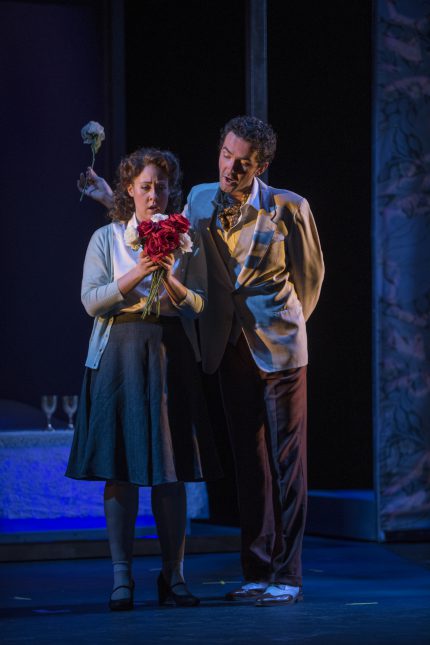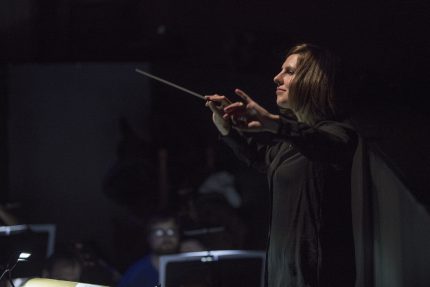COT illuminates “Iolanta” with ardent vocalism, rich Russian flavor

There is not a whole lot of music by Pyotr Ilyich Tchaikovsky that has not been heard and reheard in Chicago over the past century and a half.
Yet Saturday night at the Studebaker Theater, Chicago Opera Theater plugged a gap on the local music scene with what was billed as the belated Chicago premiere of the Russian composer’s Iolanta. (It’s likely safer to call this the Chicago professional debut since it’s quite possible that a local music college or conservatory may have mounted Iolanta sometime over the past century.)
Written in 1891, Tchaikovsky’s tenth and final opera relates the touching fable of the title princess who is unaware that she has been blind since birth. Trying to save his daughter additional pain, her father King René has forbidden all in his kingdom to tell Iolanta of her affliction. The king’s physician Ibn-Hakia believes that an operation can cure her but only if Iolanta has the will to see—which means she must first learn of her sightlessness.
When the high-born interloper Vaudemont and his friend Robert happen upon the sleeping princess, Vaudemont falls instantly in love with the gentle girl, only belatedly learning that she is blind when she fails to hand him a red rose at his request. The king is enraged when he finds out that Vaudemont has told Iolanta of her condition. He threatens the knight with death but (resourcefully) says if Iolanta’s sight is restored he will spare Vaudemont’s life. Iolanta’s love for the knight impels her to have the operation, which is successful. After initial fear and confusion at her newfound vision, Iolanta gives thanks to God, the king blesses the couple’s wedding and all give praise for this miracle.
Iolanta, with a libretto by the composer’s brother Modest, has its melodramatic moments and passing absurdities, to be sure. But there is often an artful poetry in the text—with Iolanta’s blindness as metaphor, the words “vision,” “image” and “light” recur repeatedly in spiritual and metaphysical as well as physical contexts. The opera also posits some surprisingly forward-looking medical insights with the king’s Muslim physician advocating a patient-willed healing that seems like an embryonic take on holistic health concepts commonly accepted today.
Musically, Tchaikovsky’s intimate, one-act opera shows his mature mastery and humanistic art at their peak. Time and again Saturday one was captivated by the melodic richness and subtly varied hues of the scoring. Despite its brevity, Iolanta is a true ensemble piece with each of the principals getting their moment in the sun. At its best, Iolanta offers breakout moments—like the soaring love duet for Iolanta and Vaudemont—that rival the best music found in Tchaikovsky’s better-known stage works.
With a strong cast, peak moments of thrilling vocalism, and a sensitive, atmospheric production, COT made the best possible case for this strange yet affecting curio.
With the intrusive directorial inanities currently being inflicted on Wagner’s Siegfried at the other end of the Loop fresh in one’s mind, one was wary about how COT would tackle this challenging piece.
Fortunately the company has engaged Paul Curran, who is one of the finest opera hands we have. Unlike some opera directors who prefer to make over works in their own dubious image, Curran is that genuine contemporary rarity—a self-effacing director who believes his mission is to serve the composer’s vision and the piece to ensure they come off as successfully as possible. (Curran’s brilliant, cinematic staging of Alban Berg’s Lulu for Lyric a decade ago is long overdue for revival.)
The Scottish director has updated the time from 15th-century France to what looks like the American 1940s, judging by Jenny Mannis’s period costumes. Otherwise, this modern-dress production is remarkably faithful to the score and the libretto. In addition to making the somewhat awkward action move as fluidly as possible, Curran has illuminated the storyline with deft staging inspirations that enhance the story—like the opening silhouette of a stricken Iolanta reaching out in fear and fright. Currran’s denouement improves on the original with a sweet staging touch at the curtain that makes such perfect sense one wonders that it didn’t occur to either of the Tchaikovsky brothers.
A couple elements didn’t quite come off. While it made for a striking visual, having Ibn-Hakia appear with Day-Glo tribal faceprint during his aria—and reveal cabalistic symbols inside his coat—made the Moorish doctor seem more Mephistophelian than insightful and compassionate. And let’s please jettison the piling up of countless bouquets into Iolanta’s arms in the final scene, which proved so distracting one feared she was going to drop them all on the stage.
Scenic designer Alan E. Muraoka has once again done yeoman work on a tight budget, with simple sets and illuminated square pillars with interior projections that depict the forest trees, swirling circles, and, in one haunting moment, multiple eyes. Muraoka’s effective minimalist sets were enhanced by Driscoll Otto’s atmospheric lighting.

In the challenging title role, Katherine Weber made a most impressive company debut. Her soprano sounded ample in size and projected with sure impact in the mid-size venue, some glassy hardness at full volume apart. Weber brought dramatic conviction and touching sensitivity to Iolanta throughout, making her a naturally sympathetic and credibly sightless heroine without resorting to caricature.
The role of Vaudemont, who falls instantly in love with Iolanta, is nearly as tricky but John Irvin made a worthy romantic hero. The Chicago native’s febrile, echt-Slavic tenor sounded like the real thing and he delivered clarion tone in the love duet as well as bringing dramatic fire to his confrontation with the king.
The Russian language skills of the mostly American cast sounded plausibly idiomatic to these non-native ears. But when Mikhail Svetlov sang King René’s aria, we got the real thing—the Russian’s commodious, subterranean bass and spacious rendering immediately transported one to the Bolshoi stage. In addition to providing the most idiomatic vocalism of the night, Svetlov artfully found a sympathetic middle ground between the conflicted king’s love for his daughter and his overprotective denial of her condition that prevents her from being cured.
Company regular Bill McMurray brought an authoritative bass-baritone and dignified presence to Ibn-Hakia, the holistic physician who communicates the secret of restoring Iolanta’s vision.
Baritone Christopher Magiera made a raffish, Pinkerton-like figure out of Robert, Duke of Burgundy and Vaudemont’s friend. Betrothed to Iolanta at childhood, Robert loves another, and Magiera delivered an ardent rendering of his aria in praise of the more earthy, sensual qualities of his Matilde.
The ever-reliable David Govertsen got the evening off to a worthy start, etching a nice cameo of Bertrand, the slovenly castle doorkeeper. Aaron Short was a capable presence as Almeric, the armour-bearer (gun-toter in this version). As Marta the nurse, Emma Ritter proved an aptly compassionate figure. Katherine Petersen and Annie Rosen brought impressive vocal gleam to Iolanta’s friends, Brigitta and Laura.
Chicago audiences finally got the chance to experience Lidiya Yankovskaya’s conducting Saturday night, one-and-a-half years after her hiring as COT music director was announced.
The orchestral performance got off to a rugged start. The Russian-American conductor’s droopy tempo for the orchestral Introduction approached stasis, followed moments later by some of the strings veering jarringly out of tune in the luminous theme for the title heroine. The initial women’s chorus of flower gatherers nearly become unglued at one scary juncture as well.
Perhaps it was opening-night jitters, for Yankovskaya soon got a firmer handle on the proceedings and led a flexible and richly idiomatic account of this score. Coordination with the singers was largely in synch, and she showed clear sympathy with her compatriot’s music—keeping the music flowing through the unbroken 85 minutes, balancing deftly to bring out Tchaikovsky’s woodwind accents, and building lyric climaxes to resplendent payoffs.
Iolanta will be repeated 7:30 p.m. Thursday and 3 p.m. November 18. cot.org
Posted in Performances




